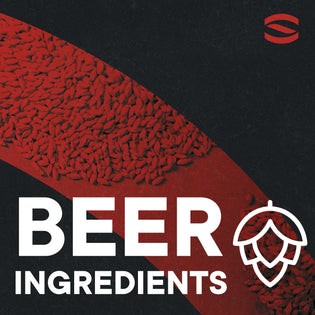The four main components of beer are grain, yeast, water, and hops. In this article, we'll discuss the different types of hops, yeasts, grains, and water that can be used to create a delicious brew. We'll also look at considerations to keep in mind when choosing the best ingredients for your beer.
Finally, we'll discuss what else can be added to beer to give it an extra kick of flavor. So grab a cold one, and let's get started!
Looking to experiment with unique and surprising ingredients in your homebrews? Spike has the tools you need to get creative and brew up something truly special.
What Is Beer?
Beer is an alcoholic beverage brewed from grains, hops, yeast, and water. It has a long history dating back thousands of years and is one of the most well-known drinks in the world. While the essential components of beer are the same, the ingredients utilized to manufacture it differ from region to region and even from brewery to brewery.
Hot water is used to steep the grains, releasing their starches and sugars. Hops are then added to the resulting liquid, known as wort, during the boiling process to impart taste and bitterness.
Following the boiling process, the wort is cooled before yeast is introduced to cause the carbohydrates to ferment into alcohol. Before being packaged in bottles or kegs, the beer is matured and carbonated.
What Are The Main Ingredients of Beer?
Beer is made up of four main ingredients: hops, yeast, water, and grain. Each of these ingredients plays an important role in the flavor, aroma, and overall quality of the beer.
Hops
Hops are one of the four main ingredients in beer, and they play an important role in the flavor and aroma of the brew. Hops are the female flowers of the hop plant, Humulus lupulus, and they are used to add bitterness, flavor, and aroma to beer. Hops are added to the boiling wort to add bitterness, and then later in the process to add flavor and aroma.
Hops are rich in essential oils and resins, which contribute to the flavor and aroma of beer. The essential oils are composed of various compounds, such as myrcene, humulene, and caryophyllene, which give beer its characteristic bitterness. The resins are composed of alpha and beta acids, which provide a pleasant, floral aroma.

Yeast
Yeast is one of the most important ingredients in beer, as it is responsible for the fermentation process that gives beer its unique flavor and aroma. Yeast is a microscopic single-celled organism that feeds on the sugars present in the grain used to make beer. The yeast consumes the sugars and produces alcohol and carbon dioxide as byproducts. Without yeast, beer would not have the same flavor and aroma.
There are two main types of yeast used in brewing beer: ale yeast and lager yeast.
Ale yeast is a top-fermenting yeast, meaning it ferments at the top of the fermentation vessel. It ferments at a higher temperature and produces a sweeter, fruitier flavor.
Lager yeast is a bottom-fermenting yeast, meaning it ferments at the bottom of the fermentation vessel. It ferments at a lower temperature and produces a crisper, cleaner flavor.
Ready to take your beer to the next level? Check out Spike Brewing's range of high-quality brewing equipment and accessories to help you perfect your beer, including fermenters and brewing systems that can help you control the fermentation process and get the most out of your yeast.

Water
Another important component in the production of beer is water. Beer would not exist without it! The majority of a beer's volume is made up of water, which also directly affects how the beer tastes.
The kind of water used in the brewing of beer is critical. The flavor of the beer can vary depending on the mineral concentration of the water used. For instance, a beer made with hard water (water with a high mineral concentration) will have a fuller body and greater bitterness than a beer made with soft water (water with a low mineral content).

Grain
The method of malting the grains involves soaking them in water and letting them germinate. This procedure activates the grain's starch-to-sugar converting enzymes. After being dried, the resulting malt can be used to make beer.
The type of grain used in beer brewing has a major impact on the flavor of the beer. Different grains provide different flavors and aromas. For example, wheat beers often have a light, bready flavor, while barley beers tend to have a more malty, sweet flavor. Different grains can also affect the color of the beer, with darker grains producing darker beers.

Considerations To Keep In Mind When Choosing The Ingredients
When it comes to choosing the ingredients for your beer, there are a few considerations to keep in mind.
Aroma Profile
First, it’s important to understand the flavor and aroma profile of each ingredient and how they will work together to create the beer you’re looking for. Different grains, hops, and yeasts can all affect the flavor and aroma of the beer in different ways, so choose the right combination for the beer you’re trying to make.
Cost Of Ingredients
It’s also crucial to consider the cost of the ingredients. While some ingredients may be more expensive than others, remember that quality ingredients will make a better beer. Also important to consider the availability of the ingredients.
If you’re looking for a specific type of grain or hop, it may not be available in your area. In this case, look for alternatives that will still give you the flavor and aroma you’re looking for.
Brewing Process
Finally, consider the brewing process when choosing your ingredients. Different grains, hops, and yeasts will require different brewing techniques and times. Knowing the brewing process and what ingredients will work best for that particular process is essential to making a great beer.
By taking the time to consider these factors, you’ll be able to choose the best ingredients for your beer and ensure that you’re making the best beer possible.
What Water Should I Use?
When it comes to brewing beer, water is an essential ingredient. The type of water you choose will greatly impact the flavor, aroma, and texture of your beer.
When selecting water for brewing, look for water with low mineral content. The minerals present in the water can react with the other ingredients, resulting in an off-flavor or unpleasant aroma.
The ideal water for brewing beer is pure, filtered water. If you don't have access to filtered water, you can also use distilled water. Distilled water has been boiled to remove all minerals and impurities, making it an excellent choice for brewing beer.
Want to learn more about the importance of water? Check out our blog, It’s A Wonderful Water World.
What Else Can I Add To My Beer?
When it comes to brewing beer, there are so many possibilities. Not only can you choose from a variety of grains and hops, but you can also add other ingredients to create unique flavors and aromas. Fruits, spices, and herbs are just a few of the items you can use to make your beer stand out.
Fruits
Fruits can be a great addition to beer, providing a unique and refreshing flavor. Depending on the type of beer you are making, the kind of fruit you choose will impact the overall flavor.
For example, lighter beers such as pale ales and lagers work well with subtler fruits such as oranges, lemons, and limes, while darker beers such as stouts and porters pair better with bolder fruits such as cherries, raspberries, and blueberries.
When adding fruit to your beer, consider the amount of sugar in the fruit. Too much sugar can cause the beer to become overly sweet, while too little sugar can result in a beer that is too dry. Consider the acidity of the fruit, as this can also affect the flavor of the beer.
Spices
Spices are an interesting addition to beer, as they can add a unique flavor and aroma to the mix. Spices are a great way to enhance the flavor profile of a beer and make it stand out from the crowd. The most common spices used in beer are coriander, cinnamon, nutmeg, and pepper.
Herbs
Herbs are a great way to add unique flavors and aromas to your beer. Herbs can be used in various ways, from adding them directly to the boil to steeping them in the wort before fermentation. Depending on the type of herb you use, it can impart a subtle, earthy flavor or a more intense, herbal aroma. Some of the most popular herbs used in brewing are sage, rosemary, thyme, oregano, and basil.
When adding herbs to your brew, remember that they can be quite strong and easily overpower the beer's other flavors. Start with small amounts and taste your beer as you go to ensure that the herbs are not overpowering. You can also experiment with different combinations of herbs to create unique flavor profiles.
Other Factors Affecting The Quality Of Beer
Fermentation
Fermentation might be the most important part of brewing. So many different variables can be manipulated at this stage to give a wide variety of flavor profiles, colors, and transparency. Things like proper yeast oxygenation, temperature control, and carbonation are not possible without the proper equipment.
We've developed two distinct product lines that will elevate your fermentation into the Stainless Age.
Final Thoughts
When it comes to making beer, the quality of the ingredients is vitally important. The right combination of grains, hops, yeast, and water can make all the difference in the flavor and aroma of your beer. The key is to experiment and find the best ingredients for your particular brew.
From pale ales to stouts, the ingredients that make up beer can range from simple to complex. But with the right combination, you can create a truly unique and delicious beer.
So take the time to find the right ingredients for your beer. With the right combination, you can craft a beer you’ll be proud to share with your friends and family.
The ingredients that make up beer may be unexpected, but the quality of your brews doesn't have to be. Shop Spike’s fermenters, brew kettles, and more to ensure your beer is always made with the best equipment.
Ready to learn more? Check out a few of these articles below!
FAQs
What is in beer that smells?
The smell of beer comes from the hops used in the brewing process. Hops are the flowers of a climbing vine that can be added to beer during the brewing process. Hops give beer its distinct aroma and bitter taste. Other ingredients that contribute to the smell of beer are the grains used, such as barley, wheat, and rye, as well as the yeast used to ferment the beer.
What is the most important ingredient in beer?
Yeast is arguably the most important ingredient in beer as it is responsible for fermentation. Without yeast, beer would not be able to ferment and would not have the carbonation, alcohol content, and usual flavor.
What gives beer its flavor?
The flavor of the beer is determined by the combination of the grains used, the hops used, and the yeast used. The grains used in beer provide the sugars that are needed for fermentation, while the hops provide the bitter and aromatic flavors. The yeast used in beer is what gives beer its distinct flavor and aroma.
Is beer all natural?
Beer is made from natural ingredients such as grains, hops, yeast, and water. However, many beers also contain added ingredients such as fruits, spices, and herbs. These ingredients can be either natural or artificial, so check the label to make sure that the beer you are drinking is all natural.





